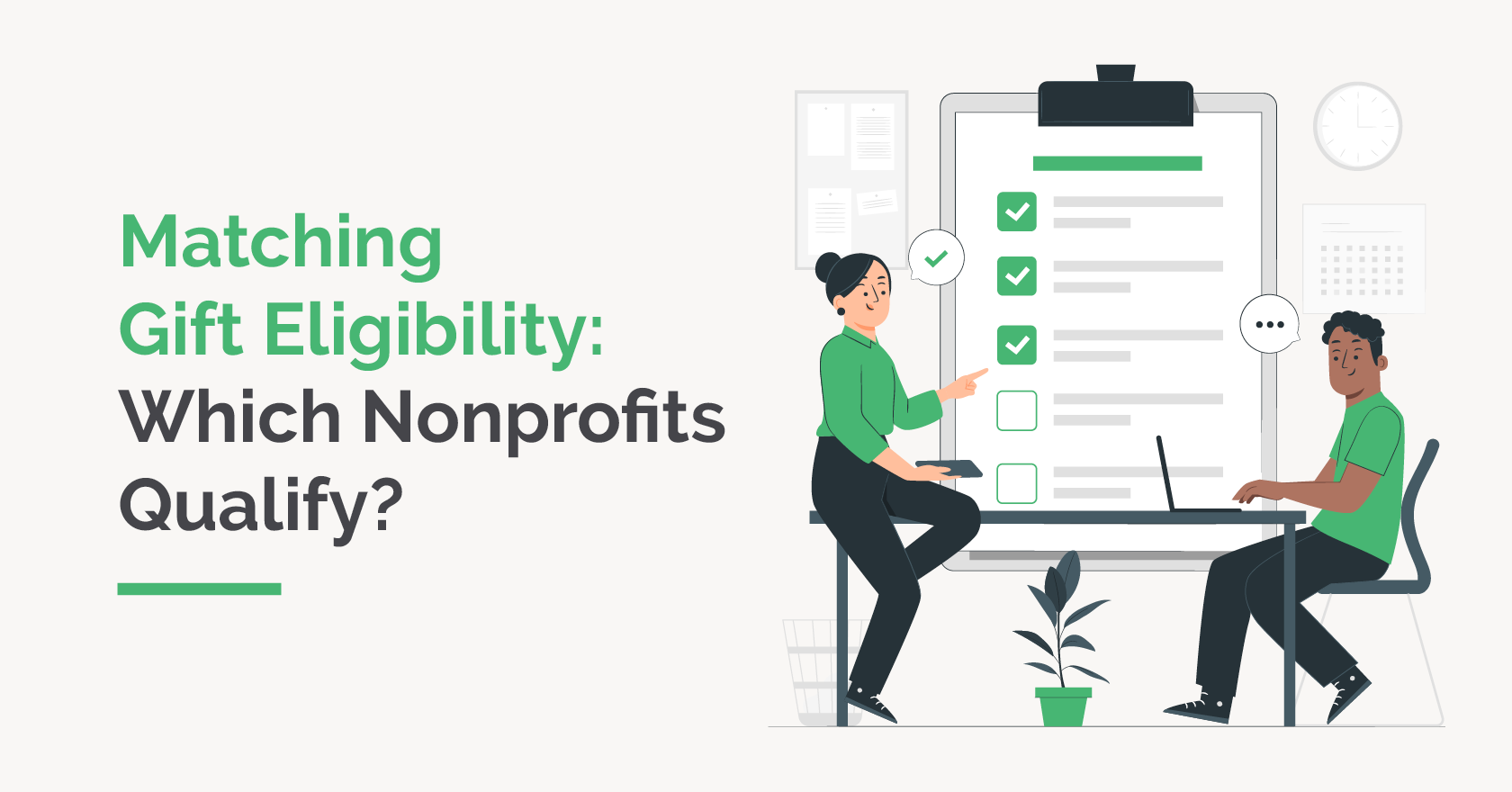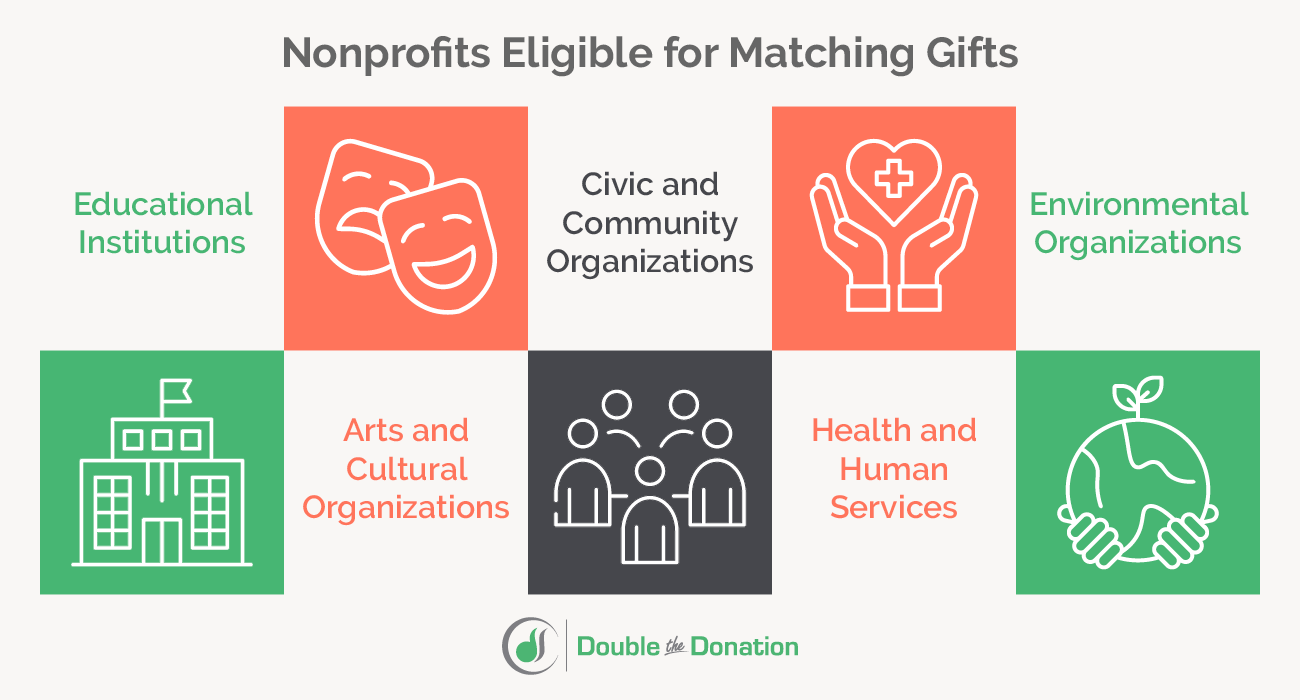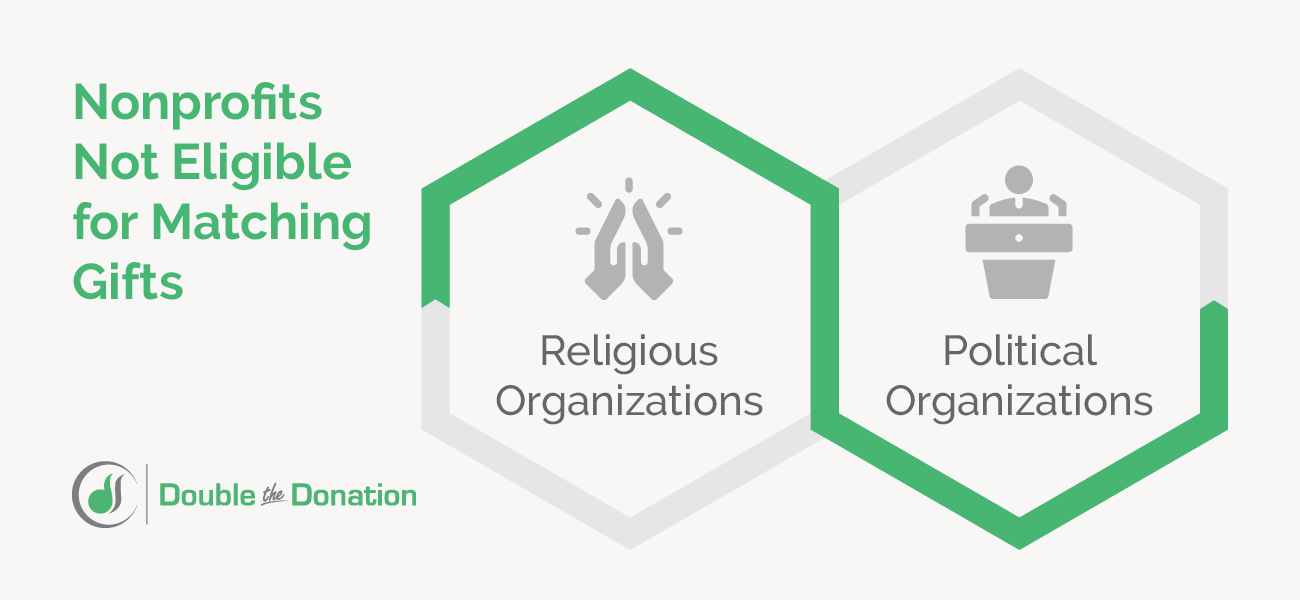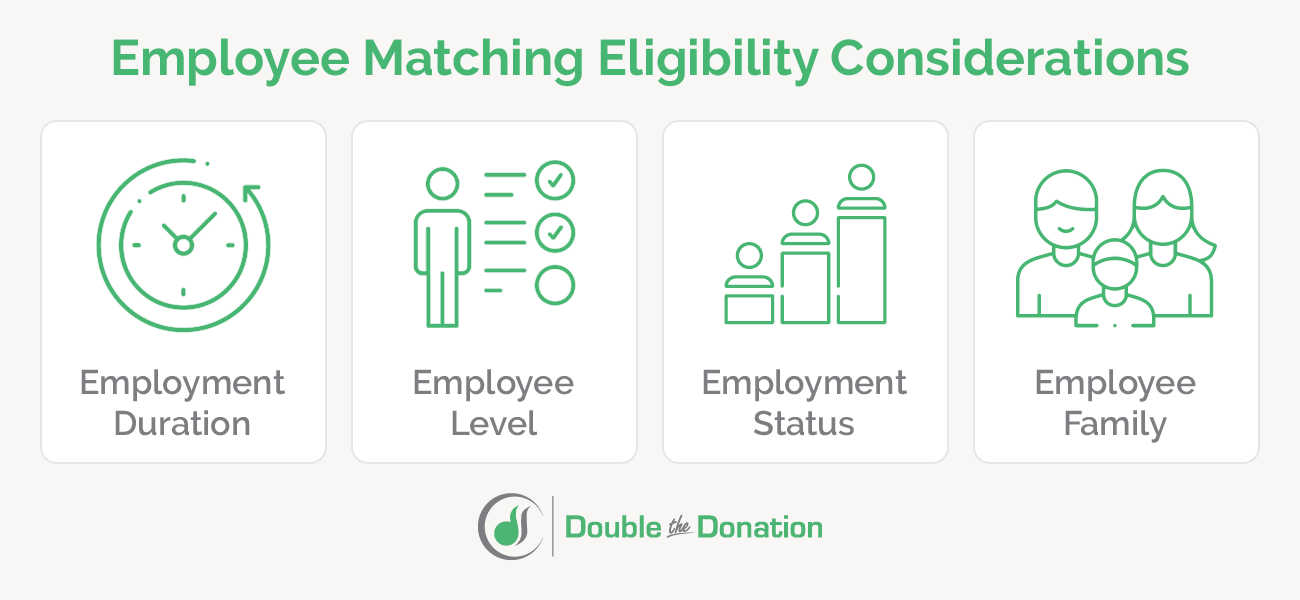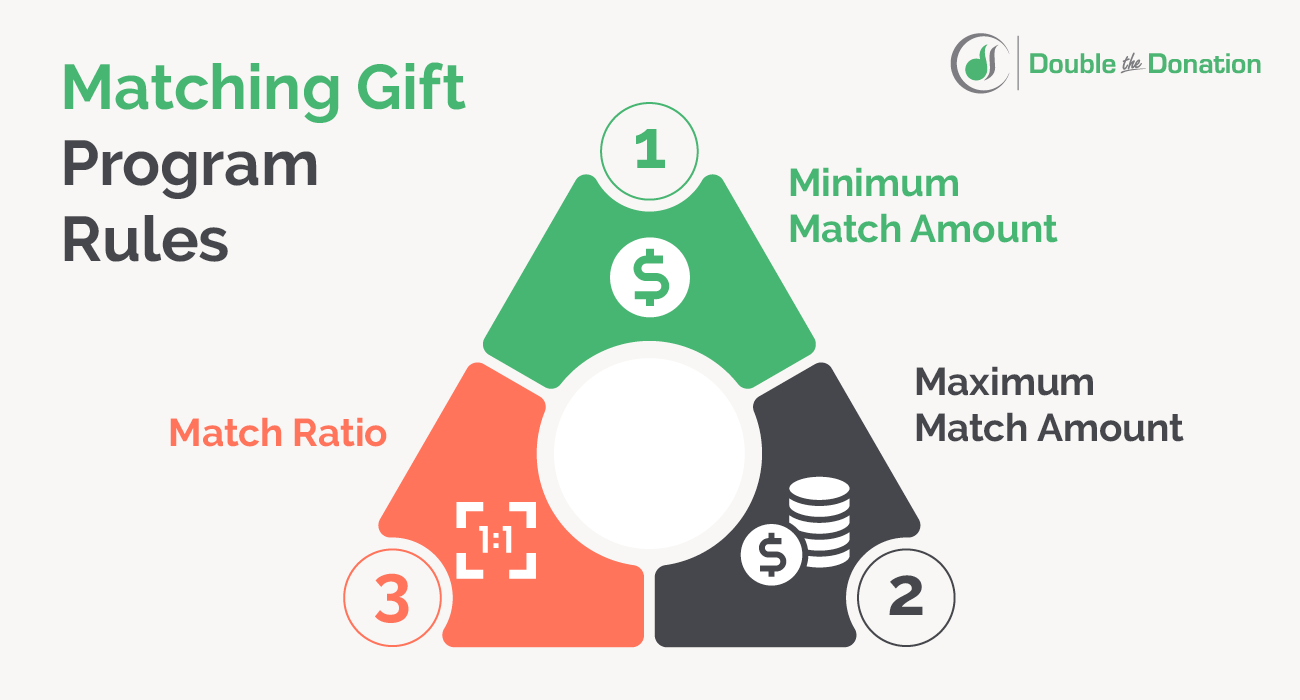Matching Gift Eligibility: Which Nonprofits Qualify?
As a nonprofit professional, you likely know that matching gifts can increase the impact of donations to your organization. However, not all nonprofits are eligible to participate in matching gifts programs.
To maximize your nonprofit’s matching gift revenue, you need to know where your organization stands in terms of eligibility. To gain a better understanding of common nonprofit eligibility standards, let’s take a look at the following:
- Matching Gift Eligibility: A Consideration
- Types of Nonprofits Eligible for Matching Gifts
- Types of Nonprofits Not Eligible for Matching Gifts
- Matching Gift Eligibility for Employees
- How Matching Gift Software Can Help
Ready to learn about typical nonprofit eligibility standards to boost your matching gift potential? Let’s get started!
Matching Gift Eligibility: A Consideration
When it comes to matching gift eligibility, what matters most is taking a close look at the programs and campaigns offered by your donors’ employers. Since matching gift standards vary from company to company, there aren’t universal guidelines. In other words, you cannot know your eligibility for all matching gift programs (unless you enlist the help of a matching gift database).
Although there’s no way to know for certain if your organization is match-eligible for all of your donors’ employee matching gifts programs, you can get a good grasp of your situation by understanding common criteria.
Types of Nonprofits Eligible for Matching Gifts
Corporate giving programs match the donations employees make to various types of nonprofits. For U.S.-based companies, the nonprofits are usually required to be 501(c)(3) organizations. Not only does this designation mean that an organization is exempt from federal income tax, but it also means that donors who make gifts can deduct those gifts from their taxes.
When reviewing a company’s matching gift guidelines, you may come across a list that outright states what types of nonprofits an employer will match donations to. Organizations that are most commonly eligible for matching gifts include:
- Educational institutions include public K-12 schools, private K-12 schools, foundations established by school districts, college-level schools that offer at least a two-year program, seminaries schools, theological schools, alumni funds, and schools or colleges within a university that conduct their own fundraising.
- Arts and cultural organizations refer to nonprofits that are focused on cultivating the arts and cultural experiences. This includes aquariums, libraries, museums, orchestras, public broadcasting stations, and more.
- Civic and community organizations are typically any community-based nonprofit, such as animal shelters, child welfare centers, homeless shelters, low-income assistance programs, and so on.
- Health and human services include organizations such as hospitals or other health-oriented nonprofits, substance abuse programs, mental health services, and domestic violence support.
- Environmental organizations refer to groups dedicated to conservation, wildlife preservation, environmental justice, green energy and sustainable development, and so on.
Most companies with matching gift programs will match employee donations to an organization that fits into one of the above categories, while others are more selective. Generally, companies choose specific causes to support because they align with their corporate social responsibility (CSR) initiatives or the causes that best reflect the company’s interests.
For example, ExxonMobil focuses its matching gift efforts on two types of nonprofits: the “Educational Matching Gift Program” and the “Cultural Matching Gift Program.” While the maximum match amount for cultural organizations is $2,000, the maximum match amount for educational institutions is $22,500. This shows where this company’s main philanthropy interest lies: in education.
In other cases, employers may be unspecific about the types of nonprofits they match gifts to and handle it on a case-by-case basis. Regardless of the situation, it falls on nonprofits to determine their eligibility status with various local employers.
Types of Nonprofits Not Eligible for Matching Gifts
While most 501(c)(3) organizations and educational nonprofits are eligible for matching gifts from a vast array of companies, companies do place restrictions on the organizations they will match for. Usually, these restrictions help them direct their giving budget to organizations that align with both their views and their employees’ views. However, note that corporations do make religious and political donations—they simply exempt them from matching gift programs to promote equity among employee beliefs.
Common organizations that are not eligible for matching gifts include:
- Religious organizations include houses of worship, such as churches, synagogues, mosques, or temples as well as other religious groups. Generally, an organization that is nondenominational or interdenominational and aims to advance religion is considered a religious organization.
- Political organizations include political parties, committees, associations, funds, and any other organization that influences or attempts to influence the selection, nomination, election, or appointment of an individual to a political office. Organizations explicitly involved in trying to elect candidates can’t be 501(c)(3)s, and thus are ineligible for matching gift programs specifically for nonprofits.
Although restrictions for these groups are common, there are some exceptions. For example, service-oriented community outreach programs offered by religious or political organizations, such as food banks and homeless shelters, are sometimes eligible for matching gifts.
Matching Gift Eligibility for Employees
Aside from considering whether your organization is eligible for most types of matching gift programs, you should also take into account eligibility requirements for employees to guide your matching gifts marketing strategy.
Employees Eligible for Matching
Some companies place restrictions on which employees are eligible for matching gifts. These limitations usually depend on one of the following:
- Duration of employment. Some corporations only offer matching donations after a worker has been employed for a certain amount of time, such as three months.
- Employee level. While most businesses offer matching gifts to all employees, some have restrictions based on the employee’s position at the company. For example, Acuity Brands only matches donations from directors and executives.
- Employment status. Businesses often have different matching gift policies for part-time and full-time employees. Some corporations, such as Sherwin-Williams, will match gifts made by retirees as well as current employees.
- Employee family. Particularly generous businesses will extend their matching gifts program to employee family members. This benefit usually only applies to spouses, but in some cases, if the employee passes away, the surviving spouse’s gifts will still be matched.
Target your promotional efforts toward individuals who are the most likely to be eligible for matching gifts. You’ll not only increase your conversion rates but also avoid frustrating supporters who aren’t eligible for matching gifts.
For example, if many of your donors work at Acuity Brands, you may be tempted to send them emails appealing for matching gifts. However, once you know that this business only matches donations from directors and executives, it’s clear this is not the best strategy. Instead, engage relevant employees in other ways, such as with volunteer grants or event invitations.
Common Matching Gift Program Rules
Aside from employee eligibility, your nonprofit should also pay attention to the following common matching gift guidelines:
- Minimum match amount. Some organizations establish a minimum donation amount employees must hit to be eligible for matches. The average minimum donation match amount is $34, which means donations smaller than this amount may not be eligible for matching depending on the employer’s guidelines.
- Maximum match amount. Since companies have a limited budget, they usually place a cap on the maximum donation amount they’ll match. This ceiling can either refer to the maximum amount of a single donation, a cumulative maximum for donations made in a fiscal year, or both.
- Match ratios. Most companies offer a 1:1 matching ratio, meaning that the company will directly match the employee’s donation amount. For example, if an employee donates $20 then the employer will also contribute $20. However, particularly generous companies will match at a higher ratio, such as 2:1 or even 3:1!
As you research matching gift guidelines, take a good look at the employers many of your donors share. By doing so, you’ll gain a better understanding of their programs and provide more specific advice to match eligible donors.
How Matching Gift Software Can Help
When properly handled, matching gifts can bring in substantial revenue without placing additional financial obligations on donors. However, determining your nonprofit’s eligibility and staying up-to-date on your employers’ guidelines is a long, arduous process. That’s where a matching gift database comes in handy, regardless of your nonprofit’s size or mission!
If you’re looking to invest in a matching gift database, check out Double the Donation’s industry-leading solution. With data on more than 20,000 companies, it’s the most comprehensive source of matching gift forms and instructions. Here’s how it works:
- Your nonprofit embeds the matching gift search tool into your online fundraising channels, such as your donation form or a dedicated matching gifts page.
- Donors search for their employers.
- They receive all available forms and guidelines on their company’s giving programs.
- Eligible donors who have yet to complete their matching gift application forms receive reminder emails with their employer’s guidelines.
- Your nonprofit maximizes its matching gift potential!
If you’re interested in learning more about Double the Donation and their matching gift automation software, check out this quick summary video:
Additional Resources
By learning about typical requirements and restrictions on matching gift programs, you’ll be more prepared to leverage these workplace giving initiatives to boost your nonprofit’s fundraising. Keep in mind that there’s no hard and fast rule when it comes to matching gifts eligibility, and there are bound to be exceptions to general guidelines.
If you’re interested in learning more about matching gifts, check out the following resources:
- Ultimate Guide to Marketing Matching Gifts. One of the biggest obstacles to matching gift success is a lack of awareness. With this guide, you’ll be better equipped to promote matching gifts to your supporters.
- Matching Gift Letters: The Nonprofit’s Guide to Raising More. Part of promoting matching gifts is sending compelling appeal letters to supporters. Learn more about how to write a great matching gift letter in this guide.
- Matching Gift Software Vendors: The Comprehensive List. Increase the rate of matching gifts you receive by investing in matching gift software. Discover the top vendors in this comprehensive list.
